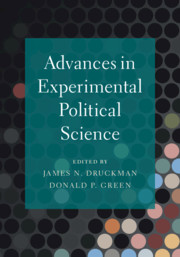Book contents
- Frontmatter
- Contents
- List of Figures
- List of Tables
- List of Boxes
- List of Contributors
- Acknowledgements
- 1 A New Era of Experimental Political Science
- Part I Experimental Designs
- Part II Experimental Data
- Part III Experimental Treatments and Measures
- Part IV Experimental Analys is and Presentation
- Part V Experimental Reliability and Generalizability
- 18 Transparency in Experimental Research
- 19 Threats to the Scientific Credibility of Experiments: Publication Bias and P-Hacking
- 20 What Can Multi-Method Research Add to Experiments?
- 21 Generalizing Experimental Results
- 22 Conducting Experiments in Multiple Contexts
- Part VI Using Experiments to study Identity
- Part VII Using Experiments to Study Government Actions
- Author Index
- Subject Index
19 - Threats to the Scientific Credibility of Experiments: Publication Bias and P-Hacking
from Part V - Experimental Reliability and Generalizability
Published online by Cambridge University Press: 08 March 2021
- Frontmatter
- Contents
- List of Figures
- List of Tables
- List of Boxes
- List of Contributors
- Acknowledgements
- 1 A New Era of Experimental Political Science
- Part I Experimental Designs
- Part II Experimental Data
- Part III Experimental Treatments and Measures
- Part IV Experimental Analys is and Presentation
- Part V Experimental Reliability and Generalizability
- 18 Transparency in Experimental Research
- 19 Threats to the Scientific Credibility of Experiments: Publication Bias and P-Hacking
- 20 What Can Multi-Method Research Add to Experiments?
- 21 Generalizing Experimental Results
- 22 Conducting Experiments in Multiple Contexts
- Part VI Using Experiments to study Identity
- Part VII Using Experiments to Study Government Actions
- Author Index
- Subject Index
Summary
Publication bias and p-hacking are threats to the scientific credibility of experiments. If positive results are more likely to be published than null results conditional on the quality of the study design, then effect sizes in meta-analyses will be inflated and false positives will be more likely. Publication bias also has other corrosive effects as it creates incentives to engage in questionable research practices such as p-hacking. How can these issues be addressed such that the credibility of experiments is improved in political science? This chapter discusses seven specific solutions, which can be enforced by both formal institutions and informal norms.
Keywords
- Type
- Chapter
- Information
- Advances in Experimental Political Science , pp. 354 - 368Publisher: Cambridge University PressPrint publication year: 2021
- 3
- Cited by

